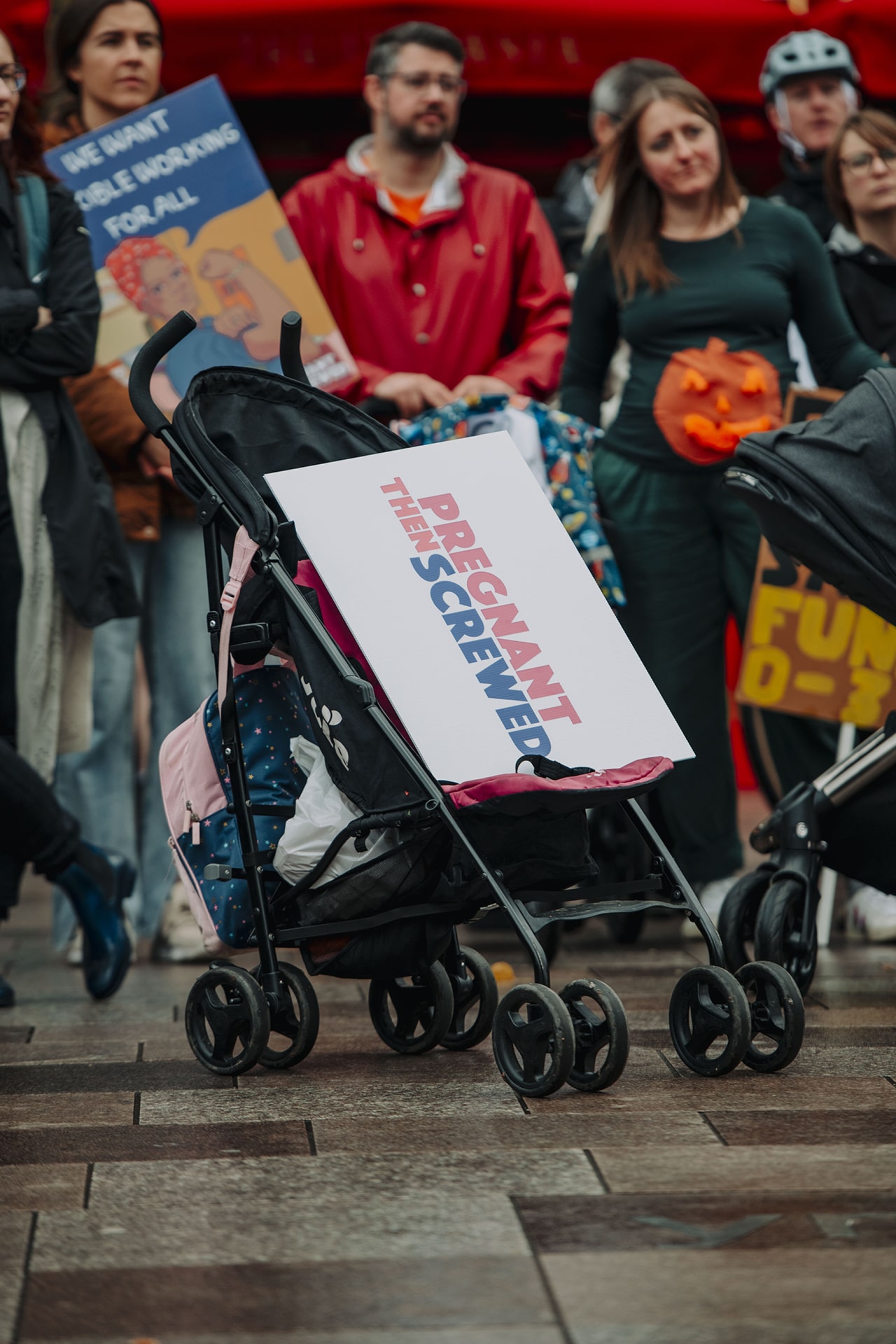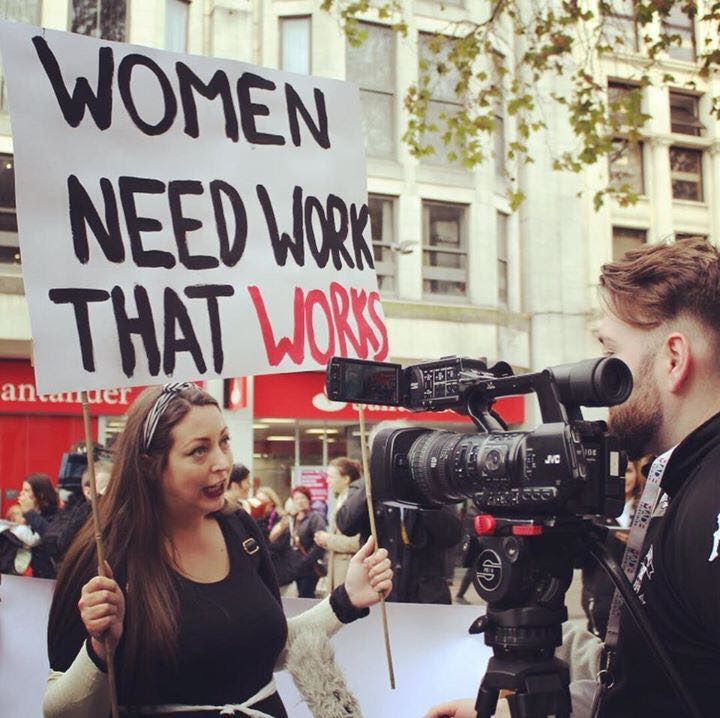#GiveMeSix
As the law stands, pregnant women or new mums who encounter discrimination in the workplace have three months, less one day, to raise a tribunal claim from the point discrimination occurs. This falls at a time when a woman is at her most vulnerable.
If she is pregnant, this type of stress can be detrimental to the health of the baby. If she has given birth in the previous 18 months, she will be coming to terms with the complexities of new motherhood, and will be extremely time-poor, exhausted and possibly lacking in confidence. Bonding during this period is critical – starting tribunal proceedings has a profoundly negative impact on bonding.
Furthermore, four out of five women who responded to a recent survey by the Royal College of Obstetricians and Gynaecologists and the Maternal Mental Health Alliance experienced at least one episode of a mental health problem during or after their pregnancy. We are forcing women to take on highly stressful tribunals when they are mentally and physically very vulnerable indeed.
There is already precedent in employment law for six months to raise a claim, if the claim is for equal pay or redundancy payment. Therefore, extending the time limit for pregnancy or maternity discrimination to six months shouldn’t be too complex. Other areas of litigation have limitation periods of up to six years. Any extension would be beneficial, though 12 months would be ideal; anecdotally, this is when many women say they are ready to fight.
The campaign
The #GiveMeSix campaign has been running for over a year and in that time, 56,000 women have signed our petition. Caroline Lucas MP lead an Early Day Motion to support the campaign, accruing signatures from 103 MPs from all political parties.
Research from the EHRC showed that 54,000 women a year lose their jobs due to pregnancy or maternity and 77% of working mums encounter potentially discriminatory treatment in the workplace. Those figures have almost doubled in the last 10 years. Yet only 0.6% of women who encounter this type of discrimination raise a tribunal claim.
Access to justice is an enormous problem. Research conducted by Gorvins Solicitors with YouGov showed that 14% of women who have encountered pregnancy or maternity discrimination did not raise a claim due to the time limit.
Despite high profile campaigns such as #metoo and #timesup, we’re still having a conversation not only about women being held back in the workplace, but for a reasonable outlet to challenge unfair treatment.
How the time limit has affected real women
Here are a handful of stories we have collected from women about how the time limit affected their ability to access justice:
“This law forced me to make a decision between justice and the health of my baby”
I was four months pregnant when I decided to tell my employer the news. Naturally, I was anxious – I knew they would have concerns about the project I was managing and how this would affect their organisation, but I had planned everything meticulously to ensure there would be a seamless transition.
I told them by email so that everything was documented and so that my plan could be clearly laid out for them to consider. I suggested they digest the information and we discuss the solution a little later. There was no further discussion. The next day they sacked me by voicemail.
I found myself four months pregnant and unemployed with a mortgage to pay. What was I supposed to do? Should I start applying for jobs and try and hide my pregnancy? I was terrified, exasperated and heartbroken.
I knew this was a serious injustice and I couldn’t allow them to get away with it unchecked, so I contacted a solicitor. They sent the organisation a letter to request compensation, and the organisation threw it in the bin. That cost me £300. I decided I had to take them to tribunal – it was my only option. I didn’t care about the money; I cared about the injustice. I wanted to ensure this wouldn’t happen to another pregnant woman.
At the same time I had a routine hospital appointment and discovered I was having a high-risk pregnancy. My baby could be born prematurely resulting in potentially life threatening problems. The worst thing I could do was to get stressed. I had to take it easy, doctor’s orders. My partner begged me to drop the case and I couldn’t live with myself if my pursuit for justice had resulted in serious health issues for my child, so I did as I was asked.
Due to the three month time limit to take a case to tribunal I couldn’t wait until I had given birth before I commenced legal proceedings. This law forced me to make a decision between justice and the health of my baby. I, like many other women who have been victims of pregnancy and maternity discrimination, want to see this time limit extended so we do not have to make these cruel and immoral choices in the future.
“I became ill soon after the birth of my child and could not face the prospect of fighting my case”
I was working as a patient’s services manager with five years’ experience of NHS strategic management. One of the consultant surgeons spotted my engagement ring and told me that I was not to have a baby.
I found out I was pregnant a few years later. During advanced pregnancy I found myself in the position of having to reapply for my own job and was unsuccessful.
As a consequence of stress and the hormone imbalances of childbirth, I became ill soon after the birth of my child and could not face the prospect of fighting my case. Once I started to feel mentally and physically well again, it was too late. I have never worked in the NHS since.
“I was very vulnerable and depressed, which meant I missed filing a complaint for an Employment Tribunal claim”
At the beginning of March 2015, I found out I was pregnant. I was really unwell at six weeks as my morning sickness started early – I had constant back pain, I was exhausted and not sleeping.
The job I do can be stressful as sometimes you have to deal with aggressive customers. I took some time off sick due to my pregnancy-related illness and my manager rang me everyday. After the fourth day of my sickness I started bleeding. On the 12th of March I miscarried. I was told at the EPU unit that there was no heartbeat. The same day I rang my manager to let him know. I was emotionally distraught as after four years of trying I had miscarried. My manager continued to hound me – there was no duty of care and finally, after an attendance management review I ended up going to work still in the process of a miscarriage.
I was sat at work bleeding, in pain, knowing all the time I was losing my baby. The constant phone calls made me very sick I had felt like ending my life at one point. Even Occupational Health had advised my manager that I should be given another four weeks off, but that was ignored. I felt harassed and bullied back into work. I raised a grievance and it was not upheld. At the time, I was very vulnerable and depressed which meant I missed filing a complaint for an Employment Tribunal claim.
My concern is that there are a lot of people that have been in similar scenarios and are suffering it alone. I found it very hard to get any kind of legal advice about this matter. Since then I have received some help from Pregnant Then Screwed but as this was after the three month time limit, it meant I was unable to access the justice I deserved.
“I could do nothing to prevent them treating another expectant parent in the same way, which broke my heart”
I suffered discrimination in my job due to being pregnant. I was made to travel unreasonable distances (in excess of 1,000 miles a week to get to my scans and back), I was refused a pay rise, then my job role was downgraded for no reason. Insulting, sexist comments from my manager followed.
Unfortunately I suffered complications at the end of my pregnancy which resulted in me being hospitalised at 32 weeks until I gave birth at 38 weeks. This also meant that I was forced into early maternity leave.
If I wanted to take the case to tribunal, I would’ve had to do so within the first four weeks of the birth of my first child. Impossible! I barely knew my name at this time and I couldn’t think beyond breast pumps and nipple cream. So how could I ever be expected to deal with the stress of standing up to fight for my rights in a tribunal?
By the time I did feel up to the battle, I had a union helping to represent me. But the only way to take it to tribunal was to return to work (the thought of which made me feel sick) and hope they make a new discriminatory mistake. So in the end, I had to skulk away with the measly pay off my ex-company offered me knowing they were at fault. I could do nothing to prevent them treating another expectant parent in the same way which broke my heart.
“The case wouldn’t be accepted in a tribunal because I hadn’t reported it within three months”
Two years ago, I was happily working 70 to 80-hour weeks. But when I fell pregnant, my relationship with my boss deteriorated rapidly. She began to find fault in all my work, bullied me about my ‘baby brain’ which she said rendered me ‘useless’, and even went as far as to tell me I was expected to have an abortion. Frankly, she was furious that I would have the ‘audacity’ to get pregnant while working for her.
I would be reduced to tears on a daily basis and the stress got so bad that my GP signed me off work for three weeks. I was frightened, vulnerable and utterly miserable. Thankfully my baby arrived healthy, but when I emailed my boss to tell her, I never got a reply. When I tried to return to my job nine months later, it was made clear that I wasn’t welcome, so I hired a solicitor. Fortunately I’d kept my emails and a diary of how she’d treated me. However, the case wouldn’t be accepted in a tribunal because I hadn’t reported it within three months.
“If I’d been in a better frame of mind, I would have taken it further due to the unnecessary stress placed on me, my baby and my family”
As a primary school teacher with two children already, I was working part time at my school (three days a week in class job sharing) I had been doing this role for three years. After a change of head teacher, who did not like part-time working, or women really for that matter (despite being a female head) I got pregnant with my third child. My head teacher was not best pleased and made comment to others like “I’m only employing gay men” said tongue-in-cheek apparently (I was not there at the time) but the underlying message was very serious. During my pregnancy I remained in class until my last six weeks, where I worked in a specialist unit as my job share partner left.
When on maternity leave three weeks before my baby was due, I had a phone call saying I was being made redundant. I was shocked – the school had just employed two more members of staff six weeks before I went on maternity leave, so I couldn’t understand how there wouldn’t be a job for me. These teachers were on a temporary contract that I later found out she changed to permanent just after I went on maternity leave. I went in for a meeting with my union rep two weeks before my due date along with another colleague who was also on maternity leave, part time and being made redundant.
After my initial meeting the redundancy still stood. It was a horrible experience at a very emotional time for me. The next day my waters broke, two weeks ahead of my due date. I was very unprepared – my previous children had both been five to seven days late! I didn’t go into active labour and ended up being induced the following day.
The day I had my third baby I had a text from my head teacher saying: check your emails ASAP. I was in hospital having just given birth! Worse of all she was fully aware I had just given birth as her email started with ‘congratulations’ – although she then denied knowing I’d had the baby!
I had a further meeting a few weeks later where I was putting my case forward for unfair dismissal mainly based on discrimination towards part-time staff. My head teacher had recently employed two more teachers and during my 12 months’ maternity leave it was very feasible someone could resign. Yet under no circumstances could she couldn’t foresee that there would be a job for me when I returned.
As it happens, my NUT rep was confident I would win with all the evidence we had plus the stress it had caused. I was sure this was why I went into labour early. Before our final meeting I had a phone call from my head saying miraculously she had found me a role at the school. All the stress I had been placed under when I had a newborn baby and a four and two-year-old at home was for nothing.
As it happens, I didn’t return to that school – I handed in my resignation, I couldn’t have worked there after everything that had happened, how horrible and insensitive my head had been and the stress she had caused at such a emotional and precious time for me.
I left it too late to do anything else about it due to the 3 month rule, which I really feel should be increased! If I’d been in a better frame of mind I would have taken it further due to the unnecessary stress placed on me, my baby and my family. After working somewhere for 10 years there was just not loyalty.



